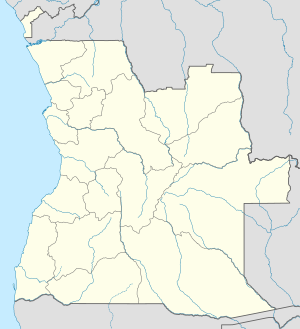
Angola, officially the Republic of Angola, is a country located on the west coast of Southern Africa. It is the second-largest Lusophone (Portuguese-speaking) country in both total area and population, and is the seventh-largest country in Africa. It is bordered by Namibia to the south, the Democratic Republic of the Congo to the north, Zambia to the east, and the Atlantic Ocean to the west. Angola has an exclave province, the province of Cabinda, that borders the Republic of the Congo and the Democratic Republic of the Congo. The capital and most populous city is Luanda.

Luanda is the capital and largest city in Angola. It is Angola's primary port, and its major industrial, cultural and urban centre. Located on Angola's northern Atlantic coast, Luanda is Angola's administrative centre, its chief seaport, and also the capital of the Luanda Province. Luanda and its metropolitan area is the most populous Portuguese-speaking capital city in the world and the most populous Lusophone city outside Brazil, with over 8.3 million inhabitants in 2020.
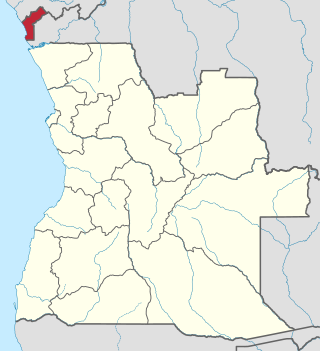
Cabinda is an exclave and province of Angola in Africa, a status that has been disputed by several political organizations in the territory. The capital city is also called Cabinda, known locally as Tchiowa, Tsiowa or Kiowa. The province is divided into four municipalities—Belize, Buco-Zau, Cabinda and Cacongo.

The National Union for the Total Independence of Angola is the second-largest political party in Angola. Founded in 1966, UNITA fought alongside the Popular Movement for the Liberation of Angola (MPLA) in the Angolan War for Independence (1961–1975) and then against the MPLA in the ensuing civil war (1975–2002). The war was one of the most prominent Cold War proxy wars, with UNITA receiving military aid initially from People's Republic of China from 1966 until October 1975 and later from the United States and apartheid South Africa while the MPLA received support from the Soviet Union and its allies, especially Cuba.
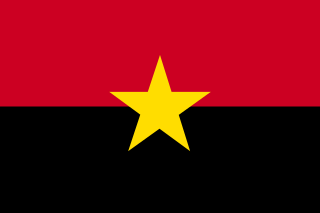
The People's Movement for the Liberation of Angola, for some years called the People's Movement for the Liberation of Angola – Labour Party, is an Angolan left-wing, social democratic political party. The MPLA fought against the Portuguese army in the Angolan War of Independence from 1961 to 1974, and defeated the National Union for the Total Independence of Angola (UNITA) and the National Liberation Front of Angola (FNLA) in the Angolan Civil War. The party has ruled Angola since the country's independence from Portugal in 1975, being the de facto government throughout the civil war and continuing to rule afterwards.

The president of Angola is both head of state and head of government in Angola. According to the constitution adopted in 2010, the post of prime minister is abolished; executive authority belongs to the president who has also a degree of legislative power, as he can govern by decree.
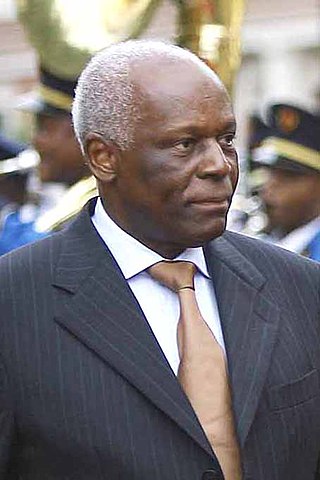
José Eduardo dos Santos was the president of Angola from 1979 to 2017. As president, dos Santos was also the commander-in-chief of the Angolan Armed Forces (FAA) and president of the People's Movement for the Liberation of Angola (MPLA), the party that has ruled Angola since it won independence in 1975. He was the second-longest-serving president in Africa, surpassed only by Teodoro Obiang Nguema Mbasogo of Equatorial Guinea.

The Angolan War of Independence, called in Angola the Luta Armada de Libertação Nacional, began as an uprising against forced cultivation of cotton, and it became a multi-faction struggle for the control of Portugal's overseas province of Angola among three nationalist movements and a separatist movement. The war ended when a leftist military coup in Lisbon in April 1974 overthrew Portugal's Estado Novo dictatorship, and the new regime immediately stopped all military action in the African colonies, declaring its intention to grant them independence without delay.
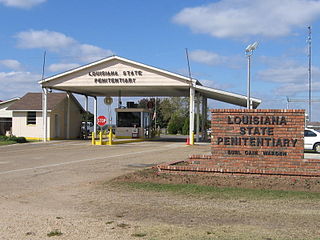
The Louisiana State Penitentiary is a maximum-security prison farm in Louisiana operated by the Louisiana Department of Public Safety & Corrections. It is named "Angola" after the former slave plantation that occupied this territory. The plantation was named after the country of Angola from which many slaves originated before arriving in Louisiana.

The Angola national football team represents Angola in men's international football and is controlled by the Angolan Football Federation. Nicknames Palancas Negras, the team is a member of both FIFA and the Confederation of African Football (CAF).
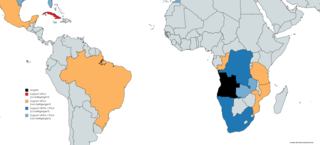
The Angolan Civil War was a civil war in Angola, beginning in 1975 and continuing, with interludes, until 2002. The war began immediately after Angola became independent from Portugal in November 1975. It was a power struggle between two former anti-colonial guerrilla movements, the communist People's Movement for the Liberation of Angola (MPLA) and the anti-communist National Union for the Total Independence of Angola (UNITA).

The South African Border War, also known as the Namibian War of Independence, and sometimes denoted in South Africa as the Angolan Bush War, was a largely asymmetric conflict that occurred in Namibia, Zambia, and Angola from 26 August 1966 to 21 March 1990. It was fought between the South African Defence Force (SADF) and the People's Liberation Army of Namibia (PLAN), an armed wing of the South West African People's Organisation (SWAPO). The South African Border War resulted in some of the largest battles on the African continent since World War II and was closely intertwined with the Angolan Civil War.
The Angolan men's national basketball team is controlled by the Federação Angolana de Basquetebol. Angola has been a member of FIBA since 1979. Ranking 23rd in the FIBA World Rankings, Angola is the top team of FIBA Africa, and a regular competitor at the Summer Olympic Games and the FIBA World Cup.

Angola and the United States have maintained cordial diplomatic relations since 1993. Before then, antagonism between the countries hinged on Cold War geopolitics, which led the U.S. to support anti-government rebels during the protracted Angolan Civil War.
Miss Angola is a national beauty pageant in Angola. The pageant was founded in 1997, where the winners were sent to Miss Universe.

The People's Republic of Angola was the self-declared socialist state which governed Angola from its independence in 1975 until 25 August 1992, during the Angolan Civil War.

Portuguese Angola refers to Angola during the historic period when it was a territory under Portuguese rule in southwestern Africa. In the same context, it was known until 1951 as Portuguese West Africa.
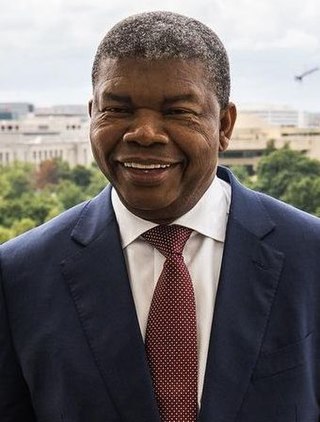
João Manuel Gonçalves Lourenço is an Angolan politician, who has served as the president of Angola since 26 September 2017. Previously, he was Minister of Defence from 2014 to 2017. In September 2018, he became the Chairman of the People's Movement for the Liberation of Angola (MPLA), the ruling party. He was the party's Secretary-General from 1998 to 2003.
COVID-19 vaccination in Angola is an ongoing immunisation campaign against severe acute respiratory syndrome coronavirus 2 (SARS-CoV-2), the virus that causes coronavirus disease 2019 (COVID-19), in response to the ongoing pandemic in the country. As of 15 June 2021, Angola has administered 1,314,375 doses of vaccines.822,109 people with the first dose and 492,266 people fully vaccinated. Angola began their vaccination program shortly after receiving their first shipment of Oxford AstraZeneca vaccine in early March 2021.
